

Google+ is the social backbone. The launch of Google+ is the beginning of a fundamental change on the web.
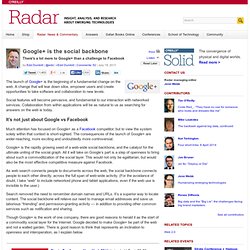
A change that will tear down silos, empower users and create opportunities to take software and collaboration to new levels. Social features will become pervasive, and fundamental to our interaction with networked services. Collaboration from within applications will be as natural to us as searching for answers on the web is today. It’s not just about Google vs Facebook Much attention has focused on Google+ as a Facebook competitor, but to view the system solely within that context is short-sighted. Twitter Is the Web's Best Public Identity Service—So Why Is It Destroying Itself? - Robinson Meyer. The bigger, civic implications of Twitter breaking up with Tumblr Join Tumblr on Monday (as I did) and you'd mosey through a little process.
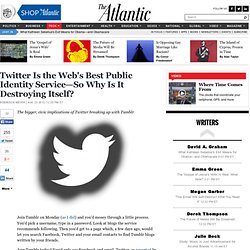
You'd pick a username, type in a password. Look at blogs the service recommends following. Then you'd get to a page which, a few days ago, would let you search Facebook, Twitter and your email contacts to find Tumblr blogs written by your friends. Join Tumblr today?
Conor Gaughan: We Are Not Arguing Over Chicken. Facebook can feel faceless sometimes.
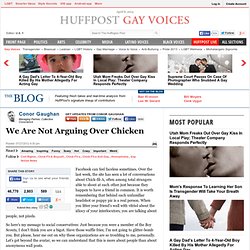
How Much Data is Created Every Minute? Why Social Networks Won't Kill the Blog. Elisa Camahort Page is co-founder and COO of BlogHer, Inc., the leading cross-platform media network created by, for and with women social media leaders.
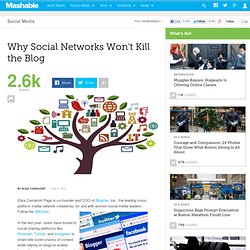
Follow her @ElisaC. In the last year, users have turned to social sharing platforms like Pinterest, Tumblr, and Instagram to share bite-sized snacks of content, while relying on blogs to enable longer forms of communication and self-expression. In one sense, it’s become the equivalent of a social media full meal. But, as if on cue, online Cassandras meet this growth in social sites with various visions of social media death. Are these newer tools Twitter-killers? When looking at the data about how these new sharing platforms play, particularly with blogs, it’s more accurate to consider them all to be a blogger's best friend.
The move, particularly from text and link-sharing to image-based sharing, has also worked wonders for blogs. Taking a long view of media, TV didn’t kill radio or the movies. How Twitter Changed Literature & Culture. What's the Latest Development?
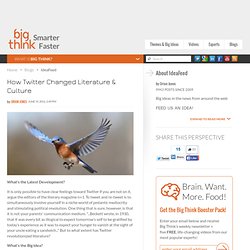
It is only possible to have clear feelings toward Twitter if you are not on it, argue the editors of the literary magazine n+1. To tweet and re-tweet is to simultaneously involve yourself in a niche world of pedantic mediocrity and stimulating political revolution. Ray Bradbury wasn’t a digital dinosaur; e-backlist coming. Ray Bradbury was right about so many things and spellbinding about so many others that it almost hurts to write this: Ray Bradbury was wrong when it came to reading.
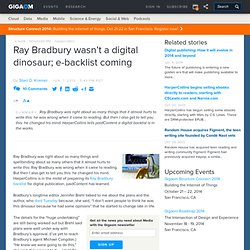
But then I also get to tell you this: he changed his mind. HarperCollins is in the midst of preparing its Ray Bradbury backlist for digital publication, paidContent has learned. Bradbury’s longtime editor Jennifer Brehl talked to me about the plans and the author, who died Tuesday because, she said, “I don’t want people to think he was this dinosaur because he had some opinions” that he started to change late in life. The details for the “huge undertaking” are still being worked out but Brehl said plans were well under way with Bradbury’s approval.
(I’ve yet to reach Bradbury’s agent Michael Congdon.) What is Social Media. Social media. Diagram depicting the many different types of social media There are many effects that stem from internet usage.
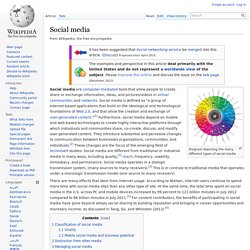
According to Nielsen, internet users continue to spend more time with social media sites than any other type of site. At the same time, the total time spent on social media in the U.S. across PC and mobile devices increased by 99 percent to 121 billion minutes in July 2012 compared to 66 billion minutes in July 2011.[5] For content contributors, the benefits of participating in social media have gone beyond simply social sharing to building reputation and bringing in career opportunities and monetary income, as discussed in Tang, Gu, and Whinston (2012).[6]
Internet means end for media barons, says Murdoch. Rupert Murdoch last night sounded the death knell for the era of the media baron, comparing today's internet pioneers with explorers such as Christopher Columbus and John Cabot and hailing the arrival of a "second great age of discovery".
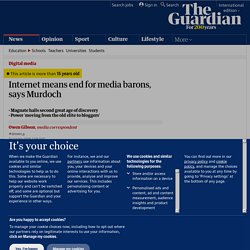
The News Corp media magnate nurtures a long-held distaste for "the establishment" but last night confided to one of the few clubs to which he does belong - The Worshipful Company of Stationers and Newspaper Makers - that he may be among the last of a dying breed. "Power is moving away from the old elite in our industry - the editors, the chief executives and, let's face it, the proprietors," said Mr Murdoch, having flown into London from New York after celebrating his 75th birthday on Saturday.
Far from mourning its passing, he evangelised about a digital future that would put that power in the hands of those already launching a blog every second, sharing photos and music online and downloading television programmes on demand.